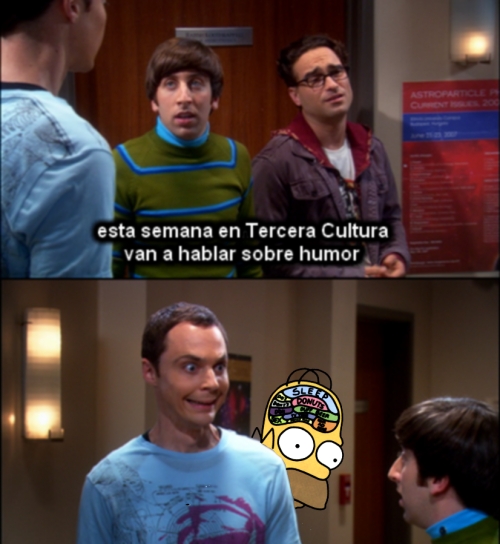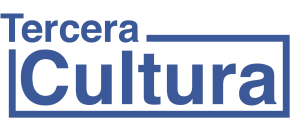 Tercera Cultura + Comedia = EPIC WIN! Invitamos a nuestra amiga Paloma Salas de Niño Gordo para conversar sobre humor y cognición. La Psicolingüística de los chistes, la Commedia dell’arte y los prototipos, los géneros humorísticos, el stand-up, las series de televisión, los tropos literarios en los guiones televisivos y el porqué Sheldon es nuestro héroe… todo al ritmo del Jappening con Ja y Monty Python.
Tercera Cultura + Comedia = EPIC WIN! Invitamos a nuestra amiga Paloma Salas de Niño Gordo para conversar sobre humor y cognición. La Psicolingüística de los chistes, la Commedia dell’arte y los prototipos, los géneros humorísticos, el stand-up, las series de televisión, los tropos literarios en los guiones televisivos y el porqué Sheldon es nuestro héroe… todo al ritmo del Jappening con Ja y Monty Python.
Clickea play!
O descárgalo desde acá: http://www.podcaster.cl/2010/12/tercera-cultura-35/
An important, recent, successful, and closely related theory is Raskin’s (1985) linguistic-semantic theory of verbal humor. This work has conclusions that are quite close to the present theory. The central idea is that in verbal humor, the text must be compatible with two different semantic scripts which are opposite in one of a number of particular ways: obscenity/no obscenity, violence/no violence, no money/money, death/life, bad/good. Each of these oppositeness relationships obviously has a moral and affective content, and while a list of these may be useful within a taxonomy of moral affects, it seems clear from the outset that they are simply particular instances of the generalization given in the present theory, which subsumes all of these oppositeness relationships in the terms of Normality versus subjective moral Violation. Obscenity, violence, poverty, death and badness are moral violations which we all care about; whereas, the non-violent, the non-obscene, the rich, the living and the good, are all seen as within the social and moral order of the world which we accept as normal and desirable. The present theory makes use of a more abstract generalization and thereby simplifies things considerably. Simplification not only pleads Occam’s Razor, but also allows one to think about more complex issues, so that we may attempt to penetrate issues previously mysterious, including many classes of observations beyond verbal humor. Raskin’s theory is strictly limited to jokes, viewed as linguistic forms, or texts. Because of this restriction, it can’t deal with differences that aren’t in the text itself. It does not deal with humor that makes no use of linguistic means — sight gags and slapstick, for example. It does not deal with differences in interpretation, such as jokes that fail in some situations but not others — where, for example, a difference in perceived humor is related to differences in affective evaluations by different subjects, or to differences in the tension in a social situation, etc. Clearly humor is not restricted to jokes; the present theory relaxes this restriction. Since the present theory also generalizes over the classes of oppositeness-relationships that Raskin discusses, it may be seen in both respects as a generalization of Raskin’s theory, to which it is otherwise closely related. (fuente: http://www.tomveatch.com/else/humor/paper/node21.html)
LINKS:
- Theories of humor (wiki)
- An application of the General Theory of Verbal Humour to Two American Sitcoms (pdf)
- pronto, más links!
BONUS: Sketches!
LOL MARTÍNEZ!
No encontramos una versión subtitulada del “chiste de los aristócratas”, aqui va la version de Gilbert Gottfried






8 comments
Felipe says:
Dic 15, 2010
Falta incorporar el estilo de humor George Carling y Plan Z
guayec says:
Dic 15, 2010
bajando…
(y les luthiers?)
guillermo says:
Dic 15, 2010
http://www.youtube.com/watch?v=8ZvugebaT6Q
guillermo says:
Dic 15, 2010
http://www.youtube.com/watch?v=COsbOugGGnk
Alejo says:
Dic 16, 2010
Qué buen programa, mis felicitaciones. Yo lo conocia como “el chiste del chanchito café” y tenia su segunda parte de “el chiste Ronald Reagan”, se imaginan tras eso que es un chiste muy viejo…
corrales(!) says:
Dic 16, 2010
humor serio y locuaz
Felipe says:
Dic 19, 2010
Yo lo conocía como el chiste del Guatón Meneses
pamela says:
Dic 19, 2010
creo que van a tener que hacer otro programa sobre humor. Faltó abordar otros tipos de humor: los juegos de palabras, los memes, monty patton, plan z, las películas de lesli nilsen, los insultos (por qué llegan a ser graciosos), los simpson’s y south park, el humor con “crítica social”. se quedaron el los esterotipos más clasicos.
en resumen y paradójicamente estuvo algo fome